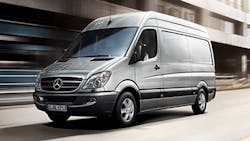Will Daimler Dodge Import Tariffs, Unions With New US Factory?
German automaker Daimler AG broke ground this week on a $500 million plant in Charleston, South Carolina, to build vans, with the company hoping at last to avoid steep U.S. import tariffs.
When the factory comes online by the end of the decade, it may also help the company pay lower wages and circumvent labor unions.
Volker Mornhinweg, head of Mercedes-Benz Vans at Daimler, said the key reasons for putting the plant in Charleston were the city’s excellent port operations and logistics, and because Daimler already operates a factory next door. Avoiding the 25% tariff that the United States puts on imports of commercial vehicles was also crucial.
“We won’t have to pay the tariff,” he said, adding that the Mercedes-brand Sprinter vans were currently built in Dusseldorf, Germany, and then shipped to the United States, where they are re-assembled. “It’s a logistical nightmare,” according to Mornhinweg.
South Carolina wages are markedly lower than those in Germany and the governor, Republican Nikki Haley, opposes organized labor.
“We discourage any companies that have unions from wanting to come to South Carolina because we don’t want to taint the water,” she told The Greenville News.
Assembly line workers get $18 an hour in South Carolina, according to Labor Department figures. Hourly wages for German autoworkers are closer to $37 an hour.
Frank Klein, director of operations at Mercedes-Benz Vans, said the company’s practice was to pay a “competitive” wage wherever it builds a plant.
According to Mornhinweg, the new Charleston plant should be operational around 2020, following the introduction of the next Sprinter model, with some versions capable of running on electricity or featuring driverless navigation. The new Sprinter will also fall under Daimler’s Freightliner brand, part of its truck operations.
Daimler representatives touted their success in the U.S. commercial van market, which represents nearly half a million newly registered units per year and had traditionally been dominated by General Motors, Ford Motor Company and what is now known as Fiat Chrysler Automobiles.
The arrival of the Sprinter on the market helped popularize the European style of van, spurring American makers to market their own similar, taller versions, suitable for different trades and cargos. The van can also be outfitted as an ambulance, according to Bernhard Glaser, head of Mercedes-Benz Vans USA.
Mathias Geisen, head of marketing for Mercedes vans in the United States, said the Ford Transit van had quickly captured 50% to 60% of the market, while Mercedes held 8% to 9% based on current sales. Geisen said Ford enjoyed a robust, nationwide network of dealerships, while the Ram ProMaster was built in Mexico and therefore not subject to U.S. trade barriers.
The Charleston plant will help even the playing field for Daimler, Geisen said.
Daimler is not the only automaker to set up operations in the southern United States, where organized labor has struggled to make inroads. Volkswagen, Nissan and Honda also maintain auto plants that the United Automobile Workers has yet to bring into its fold.
According to Glaser, Mercedes-Benz vans have risen in U.S. sales for five straight years. One of the Sprinter’s selling points will be its easy customization to meet each customer’s needs.
“You’re the expert in your trade,” Glaser said, “and your van is the tool to get the job done.”
By Joseph Szczesny
Copyright Agence France-Presse, 2016
About the Author
Agence France-Presse
Copyright Agence France-Presse, 2002-2025. AFP text, photos, graphics and logos shall not be reproduced, published, broadcast, rewritten for broadcast or publication or redistributed directly or indirectly in any medium. AFP shall not be held liable for any delays, inaccuracies, errors or omissions in any AFP content, or for any actions taken in consequence.
